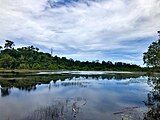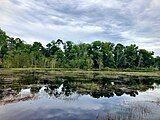Luagan Lalak Forest Recreation Park
| Luagan Lalak Forest Recreation Park | |
|---|---|
| Taman Rekreasi Hutan Luagan Lalak | |
 Monument at the park's entrance | |
 | |
| Type | Nature park |
| Location | Kampong Sungai Petai, Belait, Brunei |
| Coordinates | 4°30′55″N 114°28′31″E / 4.5153136°N 114.4751616°E |
| Area | 270 hectares (670 acres) |
| Established | 1993 |
| Founder | Yahya Bakar |
| Etymology | Channa striata |
| Managed by | Forestry Department |
| Visitors | 4,164 (1996)[1] |
| Parking | On site (no charge) |
Luagan Lalak Forest Recreation Park[a] (Malay: Taman Rekreasi Hutan Luagan Lalak) is a protected recreational forest in Mukim Labi, Belait District, Brunei.[3][4] It is a significant wetland conservation area under the jurisdiction of the Forestry Department, valued for its role in biodiversity protection and ecological importance. Unlike many recreational forest parks that include disturbed or plantation forests, Luagan Lalak remains a natural wetland ecosystem, underscoring its significance in conservation efforts.[1]
The park is situated nearly 100 kilometres (62 mi) from Bandar Seri Begawan. Visitors travelling from the capital can reach Kampong Sungai Liang in about an hour via the Telisai–Lumut Highway, where a left-hand exit leads to Jalan Labi. From there, the park is an additional 25 kilometres away. As public transportation does not serve the area, access to the park requires private vehicle transportation.[5][6]
Etymology
[edit]The park's name is derived from the Brunei Malay word luagan, which means a large non-flowing water body, while lalak is believed to be an error in either the spelling or pronunciation of the word dalak (Channa striata), a snakehead fish common in Brunei waters.[5]
History
[edit]Yahya Bakar, who was the minister of industry and primary resources at the time, initiated the groundwork in 1993. Initially, only 10 hectares were opened to the public, with the park undergoing further repairs before its official reopening in 2012 to commemorate World Forestry Day.[7] By May 2018, Luagan Lalak had welcomed over 81,000 visitors since 2001.[5]
Features
[edit]Situated within the Labi Hills forest reserve, Luagan Lalak is a 270-hectare (670-acre)[b][6] alluvial freshwater swamp (empran), notable for its dark waters and expansive fields of Lepironia articulata (purun)—grass-like plants with triangular stems and small blossoms.[c] This unique ecosystem supports a diverse array of insects, birds, and small fish. A 200-metre (660 ft) wooden bridge spans the swamp's waters. The park's amenities consisted of three gazebos, walkways, benches, and a barbecue pit. Restroom facilities are conveniently located across the road from the forest reserve's entrance.[5][6]
Numerous elusive terrestrial mammals, such as the Sunda pangolin, maroon leaf monkey, colugo, and Horsfield's tarsier, can be found in Luagan Lalak. Because of the abundance of birds, photographers and birdwatchers come to see both migratory and local species. Among the notable birds are the garnet pitta, argus pheasant, Storm's stork, Bornean bristlehead, rhinoceros hornbill, great slaty woodpecker, crested fireback, red-billed malkoha, common kingfisher, buffy fish owl, yellow-rumped flowerpecker, black-and-yellow, black-and-red, and green broadbill.[6]
Gallery
[edit]-
The lake in 2020
-
The lake in 2020
-
The lake in 2020
-
The lake in 2022
-
The wooden bridge in 2022
-
A signboard dedicated to the pink-necked green pigeon
See also
[edit]Notes
[edit]- ^ The park is sometimes known as Luagan Lalak Forest Recreational Park.[2]
- ^ On the other hand, the International Union for Conservation of Nature asserted that the area was 275 hectares.[1]
- ^ In the dry months, the water level in this park's alluvial freshwater swamp typically drops significantly, and a field of sedges, mostly Lepironia species, covers the valley. In the nation, or perhaps throughout the entire island of Borneo, this phenomenon is extremely uncommon.[8]
References
[edit]- ^ a b c Galt; Sigaty, Todd; Vinton, Mark, eds. (September 2000). The World Commission on Protected Areas 2nd Southeast Asia Regional Forum Pakse, Lao PDR, 6-11 December, 1999. Volume II - Papers Presented (Annabella ed.). Vientiane: IUCN. pp. 56 and 59.
- ^ Analisa Amu (14 February 2022). "Brunei Tourism introduces Belait Tourism Product Packages". The Bruneian. Retrieved 17 December 2024.
- ^ Cleary, Mark; Eaton, Peter (1992). Borneo: Change and Development. Oxford: Oxford University Press. p. 149. ISBN 978-0-19-588587-3.
- ^ Abdul Basid; Dediek Tri Kurniawan, eds. (2024). Proceedings of the 4th International Conference on Halal Development (4th ICHaD 2023). Vol. 838. Atlantis Press. p. 132. eISSN 2352-5398. ISBN 978-2-38476-261-3. ISSN 2731-8060.
- ^ a b c d Hamit, Rafidah (28 July 2018). "Experience Labi's serene beauty at Luagan Lalak". The Scoop. Retrieved 17 December 2024.
- ^ a b c d "Luagan Lalak Forest Recreation Park". Brunei Tourism. 31 October 2022. Retrieved 17 December 2024.
- ^ Lim, Daniel (18 August 2021). "A hidden gem in rural Belait". Borneo Bulletin Online. Archived from the original on 3 July 2022. Retrieved 17 December 2024.
- ^ "Luagan Lalak Forest Recreation Park". Department of Fisheries. Retrieved 17 December 2024.






